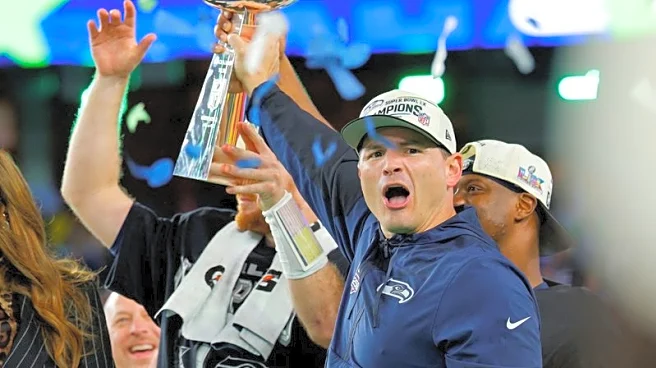What's Happening?
Dustin May, recently acquired by the Boston Red Sox from the Los Angeles Dodgers, has been struggling to meet expectations following his trade. The Red Sox, who were initially perceived to be stepping back from playoff contention after the Rafael Daves deal, chose to be buyers at the 2025 MLB trade deadline. They traded several prospects to the reigning World Series Champions for May, hoping he would bolster their pitching lineup. However, May's performance has been disappointing, with his ERA rising to 5.01 for the season and 5.68 since joining Boston. In a recent game against the Pittsburgh Pirates, May allowed eight hits, seven runs, and four walks, leading to criticism from fans. May expressed his disappointment in his performance, acknowledging that he has not lived up to the expectations set by the trade.
Why It's Important?
May's struggles are significant for the Red Sox as they fight to secure a playoff spot. His inconsistent performance has contributed to a 1-4 record in his first five games with the team, which is crucial as the Red Sox are in a tight race for a wild-card position. The team's decision to acquire May was a strategic move to enhance their chances in the postseason, but his inability to deliver consistent results has left both the team and fans frustrated. This situation highlights the risks involved in mid-season trades and the impact a single player's performance can have on a team's playoff aspirations.
What's Next?
There is speculation that May might be moved to the bullpen before the season ends, a role he might excel in. However, this is not the position May anticipated when he joined the Red Sox. With free agency looming at the end of the season, May's future with the team remains uncertain. The Red Sox will need to decide whether to continue relying on May as a starter or adjust their strategy to maximize his potential in a different role.
Beyond the Headlines
May's situation underscores the pressure athletes face when transitioning between teams, especially when expectations are high. It also highlights the broader implications of player trades in professional sports, where performance can significantly affect team dynamics and fan engagement. The Red Sox's decision to trade for May reflects the complexities of team management and the challenges of balancing immediate needs with long-term goals.










